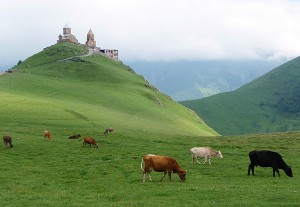Georgia on my Mind
 It is said that Georgia is the birthplace of Europe. And indeed, the term “Caucasian” to refer to white people was coined in 1800 by German scientist Blumenbach, believing as he did that the Caucasus mountain range including where Georgians live was the original source of the race (an assertion that remains controversial to this day).
It is said that Georgia is the birthplace of Europe. And indeed, the term “Caucasian” to refer to white people was coined in 1800 by German scientist Blumenbach, believing as he did that the Caucasus mountain range including where Georgians live was the original source of the race (an assertion that remains controversial to this day).
Originators or not, the little mountain country of Georgia, far on the eastern flank of Europe, was one of the first countries in the world to officially adopt Christianity in the 4th Century and took its name from St. George (and its flag from St. George’s Cross.)
Although cut off from the Roman Empire and invaded by a succession of Arabs, Persians, Mongols, Turks and eventually the Soviets, Georgian cultural integrity and autonomy remained surprisingly strong and resilient, one of the only countries (along with southern neighbor Armenia) to successfully resist the conversion to Islamism to which all of its other neighbors succumbed. This is nowhere as evident as walking down the pretty streets of capital city Tbilisi, where the Georgian women flaunt revealing low-cut tops and cleavage that would be unthinkable in neighboring Turkey and Azerbaijan, almost all of them with a prominent cross pendant nestling proudly within their bosom (a cultural fashion statement very reminiscent of Lebanon’s Christian community.)
Predating Christianity and of interest to lovers of Greek mythology, Georgia (or as it was then known, Colchis) is the land where Jason and his band of Argonauts traveled to in search of the Golden Fleece.
Although beset in the 90s by rampant corruption which plagued so many of the former Soviet Republics, and currently undergoing an uneasy truce with Russia over the breakaway province of South Ossetia, Georgia is a country on the way up. With a beautiful sights both natural and cultural, world-famous wine and cuisine, and genuine hospitality, Georgia is slowly emerging as a place with the bright future to match its historic past.
 Click to subscribe via RSS feed
Click to subscribe via RSS feed

“…invaded by… eventually the Soviets”.
This is wrong — Georgia was never invaded by the Soviets. Throughout its history Georgia expressed allegiance to Russia (Queen Tamara married a Russian prince and used his army in her conquests) until Georgia sought to become a Russian protectorate in 1783 and was finally annexed in 1801.
The Georgian parliament (the region was ruled semi-autonomously) did declare independence in 1918. Georgia allied with Germany in World War I, while providing a base for Russian menshevik army (opposition to bolsheviks during the Russian civil war). The mensheviks battled the invading Turks on Georgia’s behalf.
In 1921 Russia, aiming to end the menshevik insurgency, battled them in Georgia and subverted its government in the process. Parallels with the U.S. war in Afghanistan are quite striking.
Soviet Union was formed in 1922, a year after the civil war ended. Since Georgia was already a part of Russia, no separate Soviet invasion was needed.
Britannica has all this info.
Thanks for the great additional info and clarification, Evgeny.
Yes, there’s no question that Georgia and Russia have had a close relationship over the past couple of centuries. However, my understanding is that the Sovietization of Georgia was not voluntary following its independence in 1918. From Wikipedia:
“In February 1921 Georgia was attacked by the Red Army. The Georgian army was defeated and the Social-Democrat government fled the country. On February 25, 1921 the Red Army entered capital Tbilisi and installed a Moscow directed communist government, led by Georgian Bolshevik Filipp Makharadze. Nevertheless the Soviet rule was firmly established only after a 1924 revolt was brutally suppressed.”
Perhaps it’s a difference of interpretation. Regardless, though, what I was trying to convey in that particular passage was that Georgia has done a remarkable job of preserving cultural integrity over the years despite not always being masters of their own destiny. Whether the Soviet rule was voluntary and welcome or not, Georgia nevertheless managed to remain fiercely Georgian, distinctly different from Russians both in culture and temperament even after generations of Russian rule.
Oh, and did you notice which famous Georgian I neglected to mention in this history? 😉